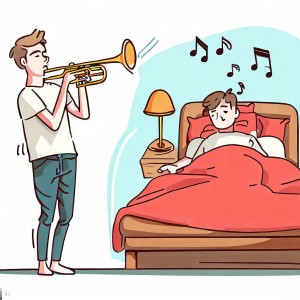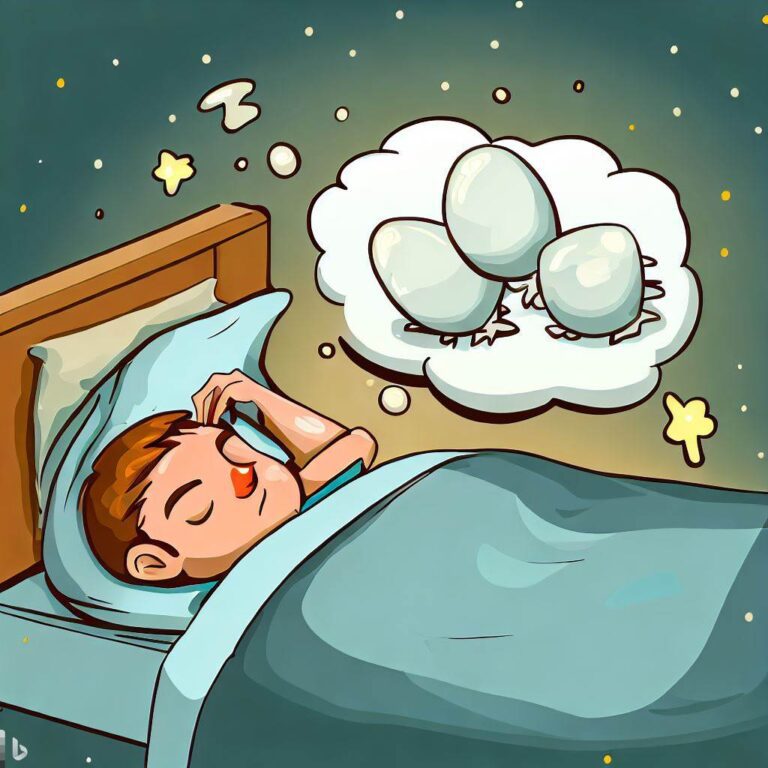Trapped in the Dream World: An In-Depth Analysis of Dreaming about Not Being Able to Wake Up

Dive into the mysterious world of dreaming about not being able to wake up, a fascinating yet perplexing phenomenon. This article explores the various interpretations, psychological implications, and potential underlying causes of such vivid dreams. Unravel the enigma of these sleep experiences and learn more about what dreaming about not being able to wake up may signify.
I. Introduction
A. Unraveling the Enigma of Dreams: The Inescapable Slumber
Delving into the realm of dreams often leads to discovering intriguing patterns and themes, among which the unsettling experience of dreaming about not being able to wake up stands out. Many people report such dreams, leaving them disoriented and concerned about their mental well-being. These dreams may occur in various forms, such as an inability to open one’s eyes or a sense of being trapped within the dream world, with every attempt to awaken being met with failure. Understanding the meaning behind these dreams can help individuals gain insight into their subconscious mind and possibly reveal unresolved emotional or psychological issues.
B. Decoding the Mystery: Interpretations and Implications
It is essential to consider various factors to comprehend the complexity of dreams that revolve around the inability to wake up. These factors include the individual’s personal experiences, cultural beliefs, and psychological state, all of which contribute to the unique narrative and interpretation of the dream. As we explore the different aspects of these dreams, we will uncover their potential symbolism and delve into the psychological implications and possible underlying causes. By examining these elements, we aim to provide a comprehensive understanding of this fascinating phenomenon and ultimately enable dreamers to navigate their subconscious landscape better.
II. Understanding Sleep Paralysis
A. The Paralyzing Grip: Definition and Symptoms
Sleep paralysis is a sleep disorder characterized by the temporary inability to move or speak while falling asleep or waking up. During an episode, the individual remains aware of their surroundings but experiences a terrifying sense of paralysis. Symptoms may include a feeling of pressure on the chest, difficulty breathing, hallucinations, and an overwhelming sense of dread. Sleep paralysis occurs when the body enters a state of muscle atonia, which prevents movement during sleep to avoid acting out dreams. In some cases, this atonia persists even as the individual regains consciousness, leading to the frightening experience of sleep paralysis.
B. A Nightmarish Link: Connection to Dreams of Being Trapped in Sleep
There is a strong connection between sleep paralysis and dreams of being unable to wake up. Sleep paralysis can be accompanied by vivid dream-like hallucinations, making the individual feel as if they are trapped within their dream world, unable to break free. This sensation can intensify the panic and anxiety experienced during the episode. Sometimes, the person may even incorporate the feelings of paralysis into their dreams, further blurring the lines between the dream state and reality.
C. Breaking Free: Coping with Sleep Paralysis Episodes
Although sleep paralysis can be distressing, there are several strategies to help manage and reduce the frequency of episodes. Maintaining a consistent sleep schedule, creating a relaxing bedtime routine, and avoiding caffeine and alcohol before bedtime can improve overall sleep quality. Also, relaxation techniques such as deep breathing or meditation can help ease anxiety and stress. In cases where sleep paralysis is persistent and severely impacts the individual’s well-being, seeking professional help from a sleep specialist or mental health professional may be beneficial.
III. Analyzing Dream Symbolism
A. The Unyielding Slumber: Common Themes in Dreams of Unending Sleep
Dreams of being unable to wake up often share common themes, such as helplessness, entrapment, or loss of control. These dreams can be incredibly vivid and may involve scenarios where the dreamer is trapped within a dream-within-a-dream, desperately trying to awaken but repeatedly failing. Other common themes include feeling physically restrained, with the dreamer unable to move or open their eyes or struggling against an invisible force that prevents them from waking up.
B. The Subconscious Mirror: Psychological and Emotional Interpretations
Dreams of unending sleep can hold significant psychological and emotional meanings. These dreams may represent helplessness or be trapped in a real-life situation, such as a toxic relationship, overwhelming stress, or an unsatisfactory job. The inability to wake up could symbolize the dreamer’s perceived lack of control over their life and inability to make necessary changes. Sometimes, these dreams may also indicate suppressed emotions or unresolved issues manifesting in the subconscious mind.
C. Cultural Tapestries: Influences and Beliefs
Cultural influences and beliefs can also shape the interpretation of dreams about not being able to wake up. In some cultures, such dreams may be seen as an omen or a message from the spiritual realm, while in others, they may be considered a reflection of one’s inner struggles and fears. Understanding the role of the cultural context in interpreting these dreams can provide valuable insights into the dreamer’s psyche and help uncover the underlying messages hidden within the dream’s narrative.
IV. Uncovering Underlying Causes
A. The Weight of the Mind: Stress and Anxiety as Triggers
Stress and anxiety are common triggers for dreams about not being able to wake up. When faced with high-stress levels, the mind may create vivid and emotionally charged dreams that reflect the dreamer’s internal turmoil. The sense of being trapped in these dreams may symbolize the individual’s perception of their real-life circumstances as inescapable, overwhelming, or uncontrollable.
B. Sleep’s Dark Side: Sleep Disorders and Their Impact on Dream Content
Sleep disorders, such as insomnia, sleep apnea, and narcolepsy, can significantly impact the content and quality of dreams. Disrupted and fragmented sleep cycles often lead to more intense, vivid, and emotionally charged dreams. These sleep disturbances may contribute to the development of dreams, where the individual feels trapped in their sleep or unable to wake up.
C. Chemical Imbalances: Medication and Substance Use Affecting Dreams
Certain medications and substances can alter the brain’s chemistry, changing dream content and quality. For example, antidepressants, antipsychotics, and sleeping pills can affect the brain’s neurotransmitters, which play a crucial role in dreaming. Substance use, including alcohol and recreational drugs, can also disrupt sleep patterns and impact dream experiences, potentially contributing to dreams of being unable to awaken.
V. Techniques to Regain Control in Dreams
A. Mastering the Dream World: Lucid Dreaming and Its Potential Benefits
Lucid dreaming, the ability to become aware of and control one’s dreams, can be an effective technique for regaining control in dreams where the individual feels trapped or unable to wake up. Through lucid dreaming, the dreamer can recognize the dream state and actively manipulate the dream environment or confront the source of their distress. This skill can help reduce anxiety and fear associated with such dreams and promote a sense of empowerment.
B. Grounding in Reality: Reality Checks and Dream Stabilization
Performing reality checks during waking hours can help train the mind to recognize the dream state more easily. Common reality checks include:
- Trying to push a finger through the palm.
- Attempting to read text or tell time.
- Questioning the logic of one’s surroundings.
By practicing these checks regularly, individuals can increase their chances of becoming lucid during a dream and regain control when they feel trapped in their sleep.
C. Navigating the Dream Landscape: Coping Strategies for Reducing Dream-Related Distress
Developing coping strategies to manage dream-related distress can help reduce the negative impact of dreams about not being able to wake up. Techniques such as journaling, discussing dreams with a trusted friend or therapist, or engaging in relaxation practices can help individuals process their emotions and better understand their dreams. Additionally, creating a calming bedtime routine and maintaining a healthy sleep environment can improve overall sleep quality and reduce the likelihood of experiencing distressing dreams.
FAQs
Q: Are dreams about not being able to wake up common?
A: Yes, many people experience dreams of being unable to wake up at some point in their lives. These dreams can be distressing and vivid, but they are not uncommon.
Q: What causes dreams of being trapped in sleep?
A: Several factors can contribute to dreams about not being able to wake up, including stress, anxiety, sleep disorders, and the use of certain medications or substances. These dreams may also be linked to sleep paralysis or reflect unresolved emotional or psychological issues.
Q: Can these dreams be a sign of a sleep disorder?
A: While not always indicative of a sleep disorder, dreams of being unable to wake up can be associated with sleep disorders such as insomnia, sleep apnea, and narcolepsy. If you consistently experience sleep disturbances or distressing dreams, it may be beneficial to consult a sleep specialist or mental health, professional.
Q: Do these dreams hold any psychological significance?
A: Dreams of unending sleep can be symbolically significant, often reflecting feelings of helplessness, entrapment, or loss of control in the dreamer’s waking life. They may also indicate suppressed emotions or unresolved issues manifesting in the subconscious mind.
Q: How can I regain control in dreams where I feel trapped?
A: Techniques such as lucid dreaming, reality checks, and dream stabilization can help individuals regain control in dreams where they feel trapped or unable to wake up. Developing coping strategies and maintaining a healthy sleep environment can reduce dream-related distress.
Q: Can cultural beliefs influence the interpretation of these dreams?
A: Cultural influences and beliefs can shape the interpretation of dreams about not being able to wake up. Understanding the role of the cultural context in interpreting these dreams can provide valuable insights into the dreamer’s psyche and help uncover the underlying messages hidden within the dream’s narrative.
Q: Is it possible to prevent dreams of not being able to wake up?
A: While it may not be possible to completely prevent these dreams, maintaining a consistent sleep schedule, creating a relaxing bedtime routine, and managing stress can improve overall sleep quality and reduce the likelihood of experiencing distressing dreams.
Conclusion
A. Dreams: Windows to the Soul – The Significance of Dreams About Being Unable to Awaken
Dreams about not being able to wake up can hold significant meaning for the dreamer, revealing insights into their emotional and psychological state. By analyzing these dreams’ symbolism, underlying causes, and cultural influences, individuals can better understand their subconscious mind and address any unresolved issues manifesting in their dream world.
B. A Journey to Self-Awareness: Embracing Understanding of Our Subconscious
As we explore and interpret our dreams, we embark on a journey toward self-awareness and understanding our subconscious mind. By recognizing the significance of dreams about being unable to wake up and employing techniques to regain control of these dreams, we can learn to navigate our inner landscape, confront our fears, and ultimately empower ourselves to live more fulfilling and balanced lives.
Suggested Readings
Exploring the intriguing world of dreaming about not being able to wake up can be an enlightening journey. To further your understanding of this phenomenon, we have compiled a list of suggested readings that delve into the complexities of dreams, sleep disorders, and the subconscious mind. These resources provide valuable insights and can help you better understand the fascinating realm of dreams.
- “Dreaming about Not Being Able to Wake Up: A Comprehensive Guide to Understanding and Overcoming Sleep Paralysis” by Dr. Jane Foster – This book offers an in-depth exploration of sleep paralysis, its connection to dreams of being trapped in sleep, and practical strategies for managing and preventing episodes.
- “The Subconscious Labyrinth: Dreaming about Not Being Able to Wake Up and the Hidden Meanings Behind It” by Dr. Matthew Turner – In this book, Dr. Turner delves into the symbolism of these dreams and how they can serve as a window into our subconscious mind, revealing unresolved emotions and psychological issues.
- “Dreams Unlocked: Mastering Lucid Dreaming and Regaining Control When Dreaming about Not Being Able to Wake Up” by Laura Adams – This book introduces lucid dreaming, teaching techniques to regain control in dreams and better understand the messages our subconscious is trying to convey.
- “The Cultural Dreamweaver: An Exploration of Cultural Influences on Dreaming about Not Being Able to Wake Up” by Dr. Amina Khan – Dr. Khan examines the role of cultural beliefs and influences on interpreting dreams, providing insights into how various cultures perceive dreams of being trapped in sleep.
- “Sleep, Stress, and the Subconscious: Uncovering the Causes of Dreaming about Not Being Able to Wake Up” by Dr. Richard Wilson – This book investigates the various factors that can contribute to dreams of unending sleep, including stress, sleep disorders, and the use of certain medications or substances.
These suggested readings are an excellent starting point for anyone interested in delving deeper into the mysterious world of dreaming about not being able to wake up. As you explore these resources, you’ll better understand the complex interplay between our waking lives and the enigmatic realm of dreams.






